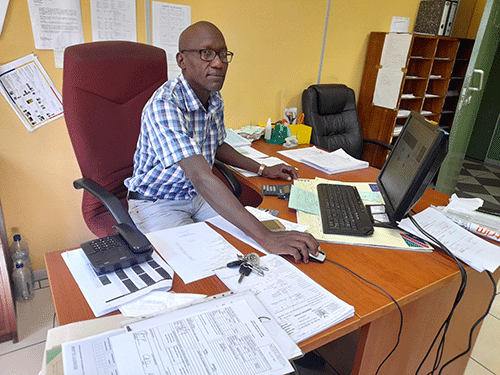As the world becomes increasingly digitised, the Ministry of Agriculture, Water, and Land Reform’s Information Technology Specialist, Jaenena Muatjetjeja, has urged students to pursue careers in information technology.
“Now that the world has gone primarily digital, there is an increasingly huge demand for people who can create specific software applications, for example,” he maintained.
Muatjetjeja, an IT systems analyst within the Ministry of Agriculture, Water and Land Reform’s directorate of general services, said while young people are often considered “digital natives”, the reality is that the majority do not possess job-relevant digital skills. As a result, Muatjetjeja says, jobs requiring coding and other advanced ICT skills are going unfilled.
He, therefore, is of the opinion that there is a need to mainstream digital skills into school curricula, establishing comprehensive on-the-job training systems and mobilising job creators in the public and private sector to employ young people in digital-centric jobs.
Trekking to the motherland
The outspoken Muatjetjeja is a Namibian who was born and bred in Botswana. His parents are descendants of Namibians who fled to Botswana during the Ovaherero – Nama genocide of 1904 – 1907.
Having embarked on his schooling in Botswana, Muatjetjeja completed his primary school through to grade 8 in that country before the great trek back to the motherland in August 1996.
Narrating his repatriation journey, Muatjetjeja has it that when the news of the repatriation reached Namibians who were living in Botswana in 1993, one of the directives was that the children should drop out of school to join their parents in the relocation.
Although his mother and other siblings left Botswana in 1993 with the buses, he and his father had to stay behind to look after the livestock, as they were promised that the Namibian government will soon come back for them and their animals.
“I was in the first semester when the repatriation started, and our parents had to take us out of school. I stayed there hoping that it would not take long for the government to come back for us, but this process took longer than we expected. We ended up staying there for an extra three years without going to school,” Muatjetjeja remembered, further lamenting the fact that their cattle were eventually slaughtered – in 1996 – due to a disease outbreak, and they had to cross into Namibia without their livestock.
In 1997, Muatjetjeja was admitted to Jacob Marengo Secondary School in Windhoek, where he completed high school. He later went to the International University of Management (IUM) where he obtained a diploma in Business Information Systems before moving to the Polytechnic of Namibia, now the University of Science and Technology (NUST), where he obtained a degree in business computing.
Joining the public service
Muatjetjeja, a Gam’s resident, joined the public service right after graduation. His only job experience was that of a cleaner, having spent a great deal of time swinging mops and pushing brooms as a cleaner at Shoprite, where he was employed as a part-time cleaner while studying at NUST.
“I decided to join the public service for many reasons, but the main one was to serve the nation by offering the knowledge I gained from my studies. Apart from taking care of the bread-and-butter issues, I also wanted to gain more experience as far as information technology is concerned,” Muatjetjeja stressed.
Serving as an analyst programmer, he is responsible for designing computer systems for the ministry, which includes developing software applications and tools, such as databases and websites as well as maintaining and managing all software applications.
“I provide technical expertise and recommendation by evaluating new IT software while identifying solutions and opportunities that can enhance the efficiency of business processes,” he gushes, adding that he is further involved in the strategy, design, development, delivery, and maintenance phases of building effective technological solutions.
Said Muatjetjeja; “My day-to-day job is mainly to make sure that our website is up and running with up-to-date information and that the users have access to that information. Besides that, it is also my responsibility to make sure that the ministry employees and stakeholders are trained on how to access or upload their information on those systems.”
He is responsible for developing and maintaining applications and databases by evaluating client needs, analysing requirements, developing software systems, identifying requirements by establishing personal rapport with potential and actual clients as well as programming the computers by encoding and adding project requirements in computer language.
He is also responsible for maintaining the ministerial website, confirming programme operation by conducting tests, and providing custom reports using database and report-writing tools.
In addition, he responds to hordes of IT-related issues at work and provides support where necessary, while maintaining professional and technical knowledge by attending educational workshops.
Job satisfaction
Muatjetjeja said although he is satisfied with the resources that the ministry has availed for him to be able to execute his duties such as software, hardware, and other equipment, he points out the continuous growth of information technology as one of the challenges he faces daily.
“There is a new development almost every day. One has to keep up with the new software and ICT tools. In every business, this can be difficult,” he said while taking solace in the fact that the knowledge he gained from school, as well as the experience he acquired from working for the government, has been helpful in enabling him to give the ministry and stakeholders informed assistance towards service delivery.
Overall, Muatjetjeja is a happy civil servant, satisfied on the job and taking each challenge within his stride and is not planning to go anywhere.
Said Muatjetjeja, “If I am in good health, I don’t mind retiring in government. My wish is to usher as much IT expertise to the government as well as to groom those young ones so that they will be able to take over when we leave.”


